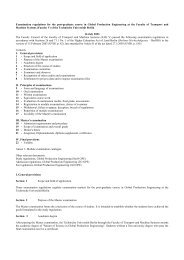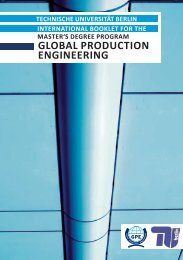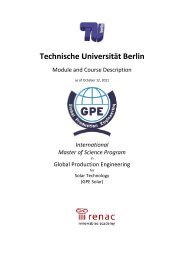Download the booklet - Global Production Engineering - TU Berlin
Download the booklet - Global Production Engineering - TU Berlin
Download the booklet - Global Production Engineering - TU Berlin
Create successful ePaper yourself
Turn your PDF publications into a flip-book with our unique Google optimized e-Paper software.
TechnischeUniversität <strong>Berlin</strong>The establishment of <strong>the</strong> Building Academyin 1799 is generally regarded as <strong>the</strong> true birthof <strong>the</strong> Technische Universität <strong>Berlin</strong>. TheMining Academy, founded in 1770, and <strong>the</strong>Vocational Academy, founded in 1821, werealso important predecessors of <strong>the</strong> presentday<strong>TU</strong> <strong>Berlin</strong>. The Building and VocationalAcademies were combined in 1879 to form<strong>the</strong> Royal Technical College of <strong>Berlin</strong>. In 1899it became <strong>the</strong> first technical college in <strong>the</strong>German Empire to be granted <strong>the</strong> right toaward doctorates to engineers. In 1916 <strong>the</strong>Mining Academy was incorporated. One yearlater, professors with budgeted posts at <strong>the</strong>Technical College were given <strong>the</strong> status offull university professors. In 1922 <strong>the</strong> variousdivisions became faculties.The darkest chapter in <strong>the</strong> history of <strong>the</strong>university began in 1933. The <strong>Berlin</strong> TechnicalCollege had become a center of Nazi activity,especially – but not exclusively – among<strong>the</strong> student body. In April 1946, with <strong>the</strong>support of <strong>the</strong> British military government in<strong>Berlin</strong>, <strong>the</strong> university re-opened its doors. Aconscious decision was made not to simplyre-open <strong>the</strong> Technical College, but to open anew university under a new name, <strong>the</strong> TechnischeUniversität <strong>Berlin</strong>. The result was <strong>the</strong>creation of Germany’s first “technical university.”In an attempt to redefine <strong>the</strong> educationalgoals of <strong>the</strong> university, all students wererequired to include courses in <strong>the</strong> humanitiesas part of <strong>the</strong>ir studies, <strong>the</strong> intention being tobroaden students’ horizons.Today, <strong>the</strong> university offers a broad range ofcourses in <strong>the</strong> humanities and social sciences.The incorporation of <strong>the</strong> <strong>Berlin</strong> PedagogicCollege has streng<strong>the</strong>ned <strong>the</strong> role of <strong>the</strong>teaching profession at <strong>TU</strong> <strong>Berlin</strong>. As an enginefor reform and invention reform legislation in<strong>the</strong> late 1960’s, <strong>TU</strong> <strong>Berlin</strong> brought fundamentalchanges to <strong>the</strong> internal organization of<strong>the</strong> university. The outdated structures of <strong>the</strong>traditional German university system wereswept aside, and university members were givena greater role in shaping university policy.Twenty-one departments were established.A president replaced <strong>the</strong> traditional dean ashead of a unified administration. Universitycommittees were made responsible foracademic self-government. After a number ofo<strong>the</strong>r changes, <strong>the</strong> number of departmentsfell to 15. In April 2001 <strong>the</strong>se were againreorganized into seven faculties in order toexploit synergies and fur<strong>the</strong>r develop <strong>TU</strong><strong>Berlin</strong>’s profile.19







